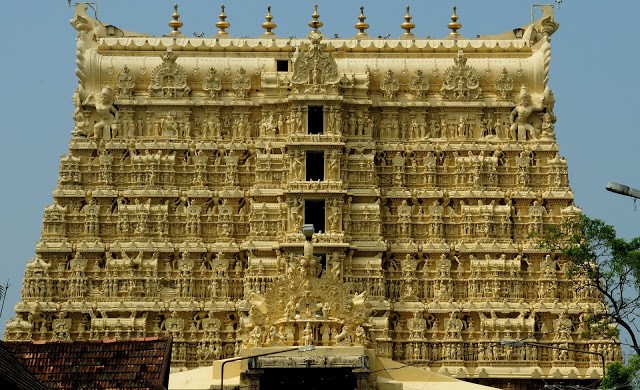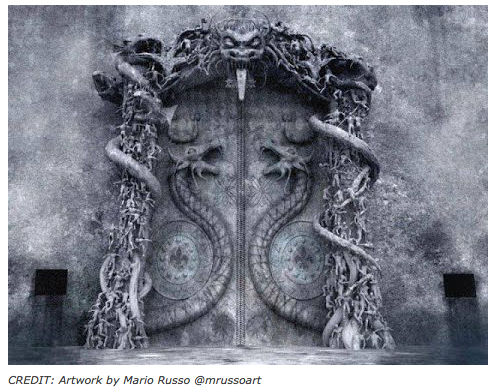
 It is a haunting sight standing in front of the mysterious “Chamber B” at the Padmanabhaswamy Temple in Kerala, India. Two embossed cobras stand guard on two enormous doors which have no bolts, latches, or any other means of entry sealed shut by sound waves from a secret chant lost in time.
It is a haunting sight standing in front of the mysterious “Chamber B” at the Padmanabhaswamy Temple in Kerala, India. Two embossed cobras stand guard on two enormous doors which have no bolts, latches, or any other means of entry sealed shut by sound waves from a secret chant lost in time.
Across cultures, as long as history has been recorded, doors and doorways have been symbolic as both an entrance and an exit and associated with portals and passageways. Doors were first seen on paintings inside Egyptian tombs with the oldest door found in Switzerland dating back 5000.
Doors hold the essence of mystery, separating two distinct areas, keeping things apart. They are a barrier, a boundary, which must be negotiated before the threshold can be crossed. The mysterious beyond is hidden from sight by the closed door, and some sort of action must be taken before the other side becomes visible and available to us. The closed-door is full of potential, for anything might lie beyond, as yet unknown and unseen. Yet the closed door may also be limiting, preventing us from ever gaining access to its hidden contents.
Sometimes gaining access may be as simple as approaching and turning the handle, but perhaps the door is locked. Then we need to knock or ring the bell and negotiate with the guardian or keeper of the door. Saying the right words, or holding the correct credentials will then secure our passage. This theme recurs in countless fairytales and myths, from Ali Baba to Cuchulain. Belonging to the club or group, which lies within, or paying the doorkeeper might also secure passage, but some doors remain stubbornly closed unless you hold the key.
So when we face a closed door, we face a choice. What action will we take? Will we turn back defeated by the barrier, or will we push forwards and attempt to gain access? The nature of the door itself and its guardians may well shape our choice, helping us decide if we will feel comfortable with what lies beyond. The symbolism of a door closing on us is one of an opportunity fading, of a potential now lost to us.
A door opening is symbolic of exciting new potential. The block, which stood before us, has now been removed and we are free to move forward and to cross the threshold into something new. We are invited forwards into change, with nothing to negotiate except the transition of one place to another. The guardian of the threshold is welcoming us forward.
The symbolism of the door is closely bound with the symbols of doorways and thresholds, and of keys and locks, hinges and handles, bells and guardians. The door itself either allows movement forwards or prevents it, and in this way we can see the door as a symbol of duality, as it is closed or open, locked or unlocked. The root of the English word door lies in the Sanskrit word Duarah, which means two doors or gates. From this come the Greek Thura, the German Tur, Middle English Dure or Dor, Old Norse Dyrr, and this all-mean door. We also find the Gaulish Doro, which means mouth, giving us an interesting image of the lips as double doors to our mouths and the words beyond. A guarded way in and out of our bodies.
While standing at the majestic doors at the Indian temple I was told that any human attempts made with technology to open the doors would unleash an unspeakable calamity in the city. Some even say opening the door against its will can release unspeakable horrors throughout India, and perhaps the rest of the world. As I turned to leave I thought about the wise words of Helen Keller, “Often we look so long at the closed door that we do not see the one that has been opened for us.”
Have any Feng Shui questions? Feel free to contact me at michelle@michellecromer.com and sign up for your Power Color or visit me on Facebook at Michelle Cromer Feng Shui.

Leave a Reply